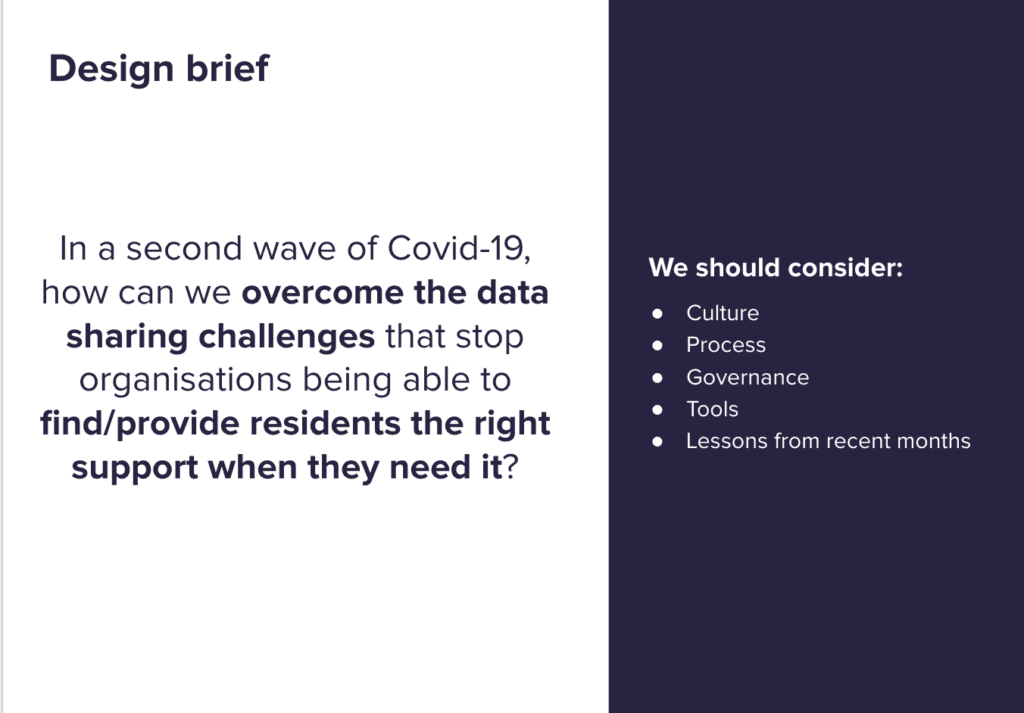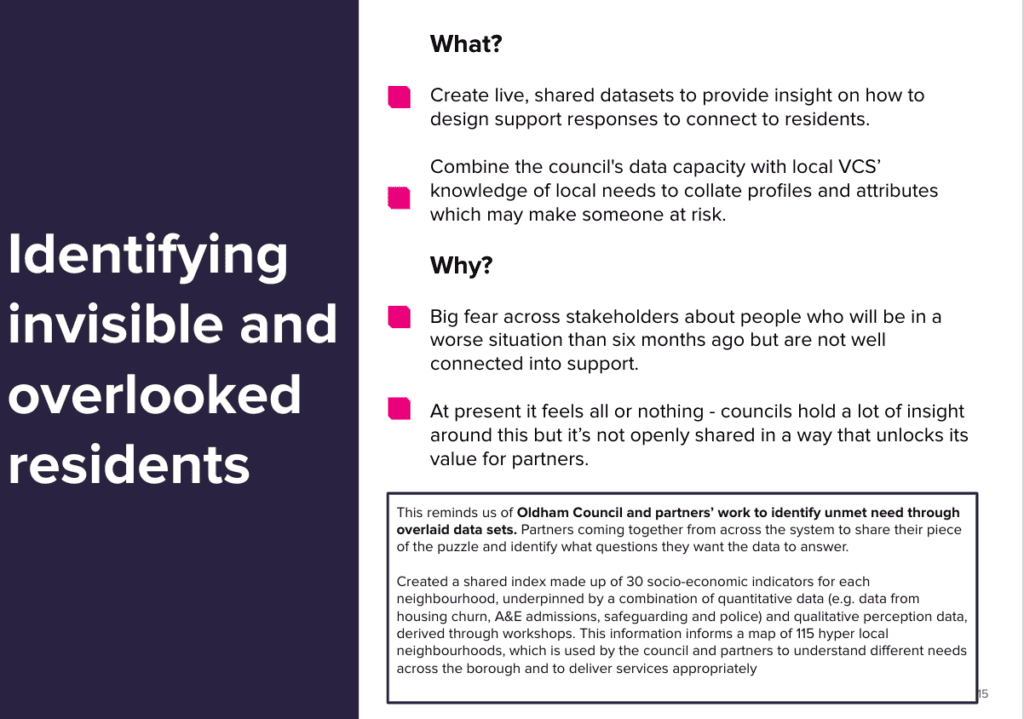MHCLG Data Exchange Project Sprint Notes # 1
Hello and welcome to the first notes from our data exchange project, improving the flow of data between councils and voluntary organisations to support vulnerable residents during COVID-19. Every fortnight over the next eight weeks we’ll be sharing our progress, lessons and reflections.
Since securing funding in August from the Ministry of Housing and Local Government (MHCLG), we’ve all been eagerly awaiting the start of this project. I’m delighted to share today the early progress from the first two weeks of work with our delivery partners, FutureGov.
Sharing data, supporting communities
Don’t let the “data” aspect of this project fool you or be intimidating. The heart of this project is first and foremost about connecting people.
I’m proud to reflect on how people and organisations across our region have come together during the pandemic to support our people and communities. Behind the scenes this was, and continues to be, a mammoth logistical undertaking. Almost overnight, new processes sprang up to deliver vital services. People worked to overcome technical challenges of separate systems and shifting guidance, as well as practical challenges of collaborating across organisations remotely.
The secure and effective exchange of data between partners has been integral to get the right help to the right people at the right time.
Yet we know there is still much we can improve. We’ve been continuously improving our processes over the last 6 months as we’ve adjusted to feedback. This project presents an opportunity to take the next leap forwards. Simply put, if we can get better at sharing data, we can get better at helping people.
Our goal
We’re keen to seize this unique opportunity to learn and draw inspiration from not only our local response, but also national and international efforts. With everyone focused around a shared problem, we know there’s lots we can learn.
The pressure is still very much on. Yet it’s important we make the time to reflect and look above the day-to-day-response to help us meet the developing needs of our communities. The initial wave of emergency response is now shifting to meet more complex resident needs, such as mental health, financial security, housing and much more. The data we need to share is changing too and it’s important our ways of working adapt and become resilient.
Along with our partners from Camden Council, The London Office of Technology and Innovation (LOTI) and the Greater London Authority (GLA), we purposefully agreed a wide brief for this project to give space for the strongest ideas to come to the fore. Yet, we’ve also made a clear commitment to supporting ideas which in 6 weeks time can make a tangible impact in the near term Covid-19 response.

Our brief for this project and the factors we will consider in our approach
Emerging themes
Yesterday we held the first of our three ‘show and tell’ events for the project. These events are where the project team shares their progress for feedback.
This time, we heard about the first two weeks of research, led by FutureGov. This team has done a great job engaging a diverse group of people from across both our region and Camden to understand the experience of data sharing from many perspectives.
From speaking to data analysts, community hub managers, voluntary organisation staff and strategic leads, they’re starting to learn about the challenges and opportunities in sharing data. It was particularly exciting to hear what could be learnt from the innovative ways people were already responding to the challenge and the ideas they had for the future.
I want to say a massive thank you to everyone involved for taking the time to engage with the research. Especially under such challenging conditions and tight timescales. It’s indicative of the great relationships we have to build upon.
Also at the show and tell, we learned about five themes emerging from the first two weeks of research and how these could be linked to innovative national and international concepts. These ranged from shared data standards, through to initiatives to identify “invisible or overlooked’ residents. Many of them were new to me and I’m really curious to learn more about them. You can read more in the show and tell presentation.

Example of one of the emerging themes about invisible and overlooked residents
Next Steps
The next step for the project is take these themes and lessons into a series of design challenge events over the next few weeks. Here we will bring together a diverse group of people from across different organisations, geographies and backgrounds, along with data and design experts to explore the themes further and develop initial concepts for testing.
It’s all very exciting and I’m eagerly anticipating our next show and tell event on Tuesday, 13 October from 3pm to 4.30pm. This event is open to all. If you would like to attend, please contact courtney@wearefuturegov.com with your contact details and we’ll share an invite.
Thanks and stay safe,
Sandra Einon
Sandra Einon


